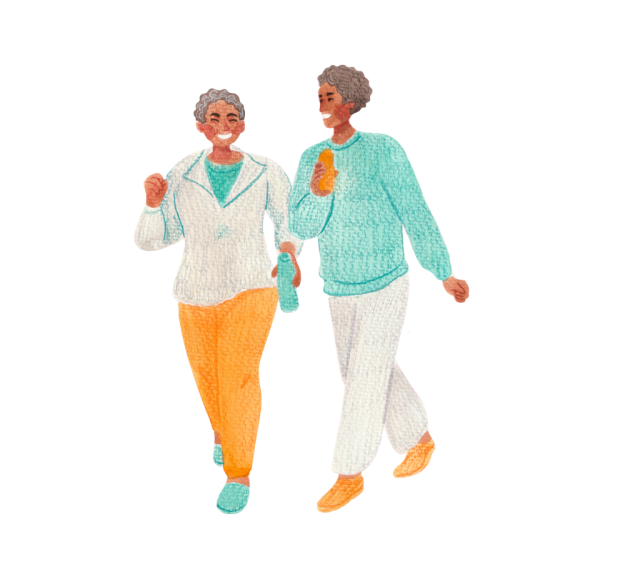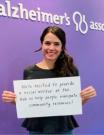June is Alzheimer's and Brain Awareness Month! Each week, the Memory and Brain Wellness Center team will share information on brain health! These important, evidence-based tips involve nutrition, sleep, nature exposure, stress reduction, physical activity, and social engagement, and cognitive stimulation. This week, we are sharing evidence-based information about staying physically active for brain health and wellness.
Quick tip:
Physical activity may boost brain resilience, even for at-risk populations
- A 2020 study of individuals at high genetic risk of frontotemporal degeneration showed that an engaged lifestyle can help the brain to better withstand effects of FTD, a phenomenon called cognitive resilience.“The results suggest that an active, healthy lifestyle can potentially enhance the capabilities of brain tissue, despite the physical change that has happened,” says Kimiko Domoto-Reilly, MD, assistant professor of neurology at UW Medicine. "This is a population that needs hope now – not later. How do we jump in and help? It’s incredible to have found support for non-pharmacological interventions that are immediately implementable and customizable to what the individual already loves to do.” Read more in: The Power of an Active Lifestyle to Boost Cognitive Resilience – Even for Those at High Genetic Risk
- People who carry one or two copies of APOE4 gene allele are thought to be more likely to develop Alzheimer’s disease. Studies have found that this higher risk population benefits the most from exercise. “It’s really encouraging because it challenges the notion that APOE4 carriers have worse disease and show signs earlier,” says UW Medicine Geriatrician Angela Hanson, MD . “These studies suggest that they have different metabolisms and routes that lead to Alzheimer’s disease, so different treatments might benefit them more or less.”
- Work up a sweat for 45 minutes, 4 times a week! A study published in Alzheimer's & Dementia of 65 physically inactive adults showed that this amount of exercise reduced tau protein in the brain and improved memory, attention and executive function.
Take it from a sleep doctor, an active day leads to a good night's sleep
- Yeilim Cho, MD, sleep physician and MIRECC Fellow in the Iliff Lab, has advice that applies to anyone, including people living with memory loss and carepartners. "Do something physically active or mentally challenging every day" she says. "Stimulate your brain with activities like reading a book, so that you get really tired and build up the sleep power to sleep at least three or four hours in a chunk at nighttime."
At one point, my doctor told me, 'Stay active. Stay social.' That's the best advice I've gotten anywhere.
-from Mary, who is living with cognitive impairment
Remember to dance!
- If you like to dance, embrace every chance to move to a beat. At the University of Illinois, researchers enrolled physically inactive men and women aged 60 – 79 in country western dancing lessons and studied the brains using imaging over 6 months. The scans showed that, compared to study controls who took walking or stretching classes, only the adults in the dancing group showed denser white matter in the brain’s fornix. This tiny triangle of tissue deep in the brain plays an important role in making and recalling memories, as well as motor performance and problem solving. Read: Dancing to Remember
Take a Stroll in Nature
- Walk for brain health and wellness. A study by Dr. Gregory Bratman, an assistant professor in the UW College of the Environment, found that people who walked for 50 minutes in a natural area showed reduced anxiety and negative emotions, and increased working memory, as compared to participants who walked in an urban setting. A 2022 nationwide study shows that exposure to green space may support cognitive health. The findings support the need for further research into the use of green space exposure as a possible way to reduce the risks of cognitive decline and dementia in older adults.
- SOAR in outdoors adventures! You are strong, and Alzheimer's disease doesn't change that. In 2019, Marigrace Becker, our Program Manager of Community Education and Impact, and Carolyn Parsey, MBWC neuropsychologist, launched a new outdoor-focused program called SOAR (Shared Outdoor Adventures for Resilience). "This program brings people with early-onset Alzheimer's diease and their care partners together at an outdoor challenge course. The event elevated spirits, fostered community, and embraced our individual strengths in the presence of group challenges," said Parsey. Excitingly, the MBWC has brought back SOAR! Learn more about the SOAR Kickoff Event.
Resources
.jpg)
According to the Physical Activity Guidelines for Americans, adults need at least 150 minutes (2½ hours) a week of moderate-intensity aerobic exercise, like brisk walking or fast dancing to tay healthy. Being active at least three days a week is best, but doing anything is better than doing nothing at all. The guidelines recommend also doing muscle-strengthening activities, like lifting weights or doing situps, at least two days a week. (Source: National Institute on Aging)
- For help getting started, Julie Pusztai, PhD, RN, (and a Memory Hub front desk volunteer!), shares the questions to ask yourself when starting to increase physical activity and ways to set goals in 'Steps to Wellness' MBWC presentation (Slides).
- Check out the interactive Activity Planner from the U.S. Department of Health and Human Services’ Move Your Way campaign. It lets you build a weekly physical activity plan and then print it out.
- Once you start exercising, use the NIA's Monthly Progress Test to check in and see how you are improving, and celebrate your successes.
- Get inspired with ideas from the Home Workouts For Brain Health' wellness presentation by Carolyn Parsey, PhD, neuropsychologist at UW Medicine (Slides). Always ask your doctor before starting any new exercise program.












